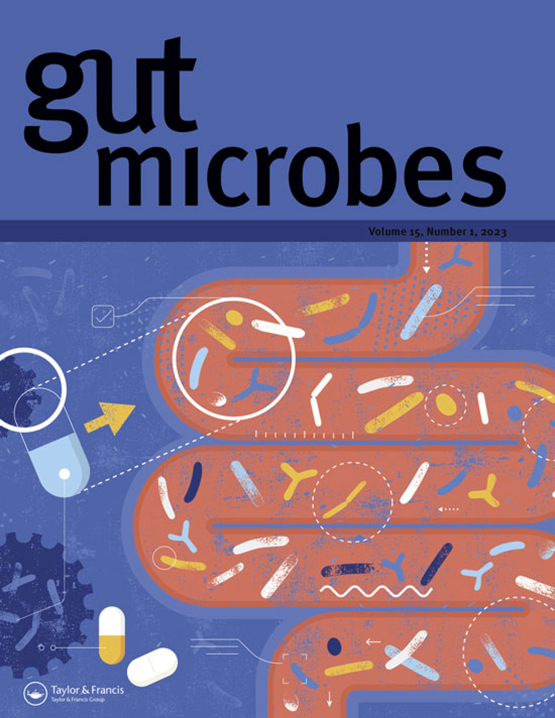Submit a Manuscript to the Journal
Gut Microbes
For an Article Collection on
Exploring the Gut-Skin Axis: Implications for Health and Dermatology
Manuscript deadline
31 May 2024


Article collection guest advisor(s)
Prof. Learn-Han Lee,
Sunway University
[email protected]
Dr. Loh Teng-Hern Tan,
Monash University
[email protected]
Dr. Jodi Woan-Fei Law,
Monash University
[email protected]
Exploring the Gut-Skin Axis: Implications for Health and Dermatology
The gut-skin axis, an emerging area of research in dermatology and gastroenterology, has garnered significant attention in recent years. This axis represents the intricate interplay between the gastrointestinal system and the skin, highlighting the notion that the health of our gut may have profound implications for the condition of our skin.
Understanding the significance of the gut-skin axis is paramount due to the prevalence of skin conditions globally, causing physical and emotional distress. Mounting evidence suggests that the gut microbiota, the trillions of microorganisms residing in our digestive tract, play a pivotal role in regulating our digestive health and our immune system. Given that the skin is a primary interface between our body and the external environment, it is increasingly apparent that the gut-skin connection may be key to addressing and preventing various dermatological issues. By exploring this axis, we have the potential to uncover new therapeutic avenues and strategies for improving skin health, not to mention the broader implications for overall well-being.
This dedicated journal collection aims to explore a comprehensive understanding of the gut-skin axis. The collection will include research articles, reviews, and expert opinions that explore novel and significant advances in areas relevant to gut-skin axis. Subtopics to be covered include, but are not limited to:
• Microbiota and Skin Health: Investigating the role of gut microbiota composition in skin conditions.
• Immune System Crosstalk: Examining the immune-mediated communication between the gut and skin and its implications for autoimmune skin disorders.
• Nutrition and Skin: Exploring the influence of dietary factors and nutritional interventions on skin health through the gut-skin axis.
• Therapeutic Approaches: Assessing the potential of probiotics, prebiotics, and other interventions to modulate the gut microbiota and alleviate skin disorders.
• Clinical Applications: Presenting case studies and clinical trials on the practical implications of the gut-skin axis in dermatology.
We invite researchers, clinicians, and experts in dermatology, gastroenterology, microbiology, and immunology to contribute their valuable insights and findings to our collection, providing innovative solutions for improving skin health and overall well-being.
Dr Lee Learn-Han is a Professor in Life Science and the Founding Head of Sunway Microbiome Centre (SMC) at Sunway University, Malaysia. He is an elected Fellow of the ASEAN Academy of Engineering and Technology (AAET), Malaysian Scientific Association (MSA) and Linnean Society of London. He received the Top Research Scientists Malaysia (TRSM) award from the Academy of Sciences Malaysia (ASM) in 2022. Dr Lee was awarded the Malaysia’s Research Star Award (MRSA) Winner 2018, recognizing him as Malaysia's best Medical Science researcher. Dr. Lee’s stature as a researcher on the international level is indicated by his ranking among the World Top 2% Scientist in 2021 & 2022 by Stanford University. His research interests are microbial systematics and host-microbiome interactions, focusing on pathogens and probiotics affects on Gut-Brain, Gut-Lung and Gut-Skin axis.
Google Scholar Profile: https://scholar.google.com/citations?hl=en&user=NBMI8ycAAAAJ
Scopus Profile: https://www.scopus.com/authid/detail.uri?authorId=23570787300
Dr Tan Loh Teng Hern is a Lecturer in Clinical School Johor Bahru (CSJB), Monash University Malaysia. He is the leader of the Innovative Bioprospection Development Research Group (InBioD). His research focuses on bioprospecting and drug discovery from microbial sources, especially on Actinobacteria (Streptomyces). He also investigates the role of gut microbiome in association with health and diseases and explores the benefits of probiotic interventions for animal and human health.
Google Scholar Profile: https://scholar.google.com/citations?user=aV56YNQAAAAJ&hl=en
Dr Jodi Law Woan-Fei is a lecturer at JCSMHS Monash University Malaysia and the Leader of Next-Generation Precision Medicine and Therapeutics Research Group (NMeT). She is a board-certified Graduate Technologist (MBOT), and a member of the Royal Society of Biology United Kingdom (MRSB). She is trained in biosystematics studies of novel Streptomyces and exploring their beneficial biological activities. Her research interests also include studying the relationships of the human microbiome with health and disease as well as understanding their therapeutic implications. She firmly believes that it is crucial to detect and identify bacterial pathogens from the microbiome associated with disease development and to generate potential microbiome-based treatment options.
Google Scholar Profile: https://scholar.google.com/citations?user=g4Oz0UMAAAAJ&hl=en
Prof. Lee Learn-Han, Dr. Tan Loh Teng Hern, Dr Jodi Law Woan-Fei declare no conflict of interest.
Benefits of publishing open access within Taylor & Francis
Global marketing and publicity, ensuring your research reaches the people you want it to.
Article Collections bring together the latest research on hot topics from influential researchers across the globe.
Rigorous peer review for every open access article.
Rapid online publication allowing you to share your work quickly.
Looking to Publish your Research?
Find out how to publish your research open access with Taylor & Francis Group.
Choose open accessSubmission Instructions
All manuscripts submitted to this Article Collection will undergo desk assessment and peer-review as part of our standard editorial process. Guest Advisors for this collection will not be involved in peer-reviewing manuscripts unless they are an existing member of the Editorial Board. Please review the journal Aims and Scope and author submission instructions prior to submitting a manuscript.